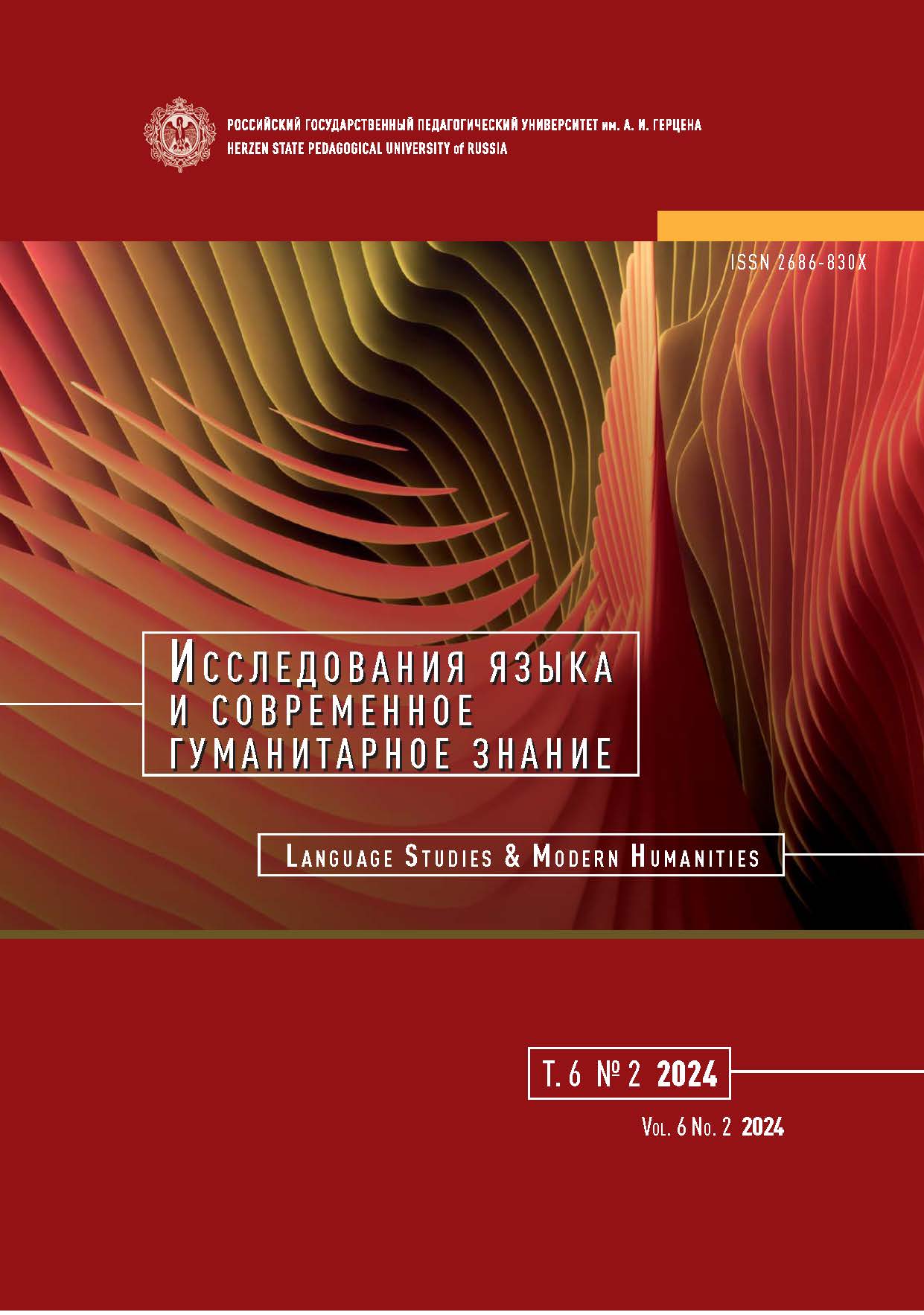Combinatorial collocations of the attribute PERFECT (insights from the British National Corpus)
DOI:
https://doi.org/10.33910/2686-830X-2024-6-2-121-128Ключевые слова:
semantic analysis, semantic field, collocations, nominative relations, corpus-based studyАннотация
The paper considers the attributive lexeme “perfect” as a linguistic and cultural phenomenon in the English language. The aim of the study is the semantic analysis of nominative collocations with “perfect”, based on the material of the British National Corpus (BNC), which contained about 3000 contextual occurrences, with the application of such methods as definition analysis, semantic and functional categorisation, quantitative analysis and cognitive modelling. From the theoretical standpoint, the research is valuable for a deeper understanding of the phenomenon and its semantic structure, especially in connection to its derivative “perfectionism” which is regarded as a professional term. Practically, the results can be interesting in the pedagogical context for teaching cognitive and translation studies, since “perfect” has a branched semantic structure and wide scope of use. As a result of the research, the function-based semantic structure of the concept was revealed: the immediate contextual collocations were identified; the semantic fields were described. The A+N structure, where A is filled with “perfect”, and N can be potentially represented with any noun from the BNC, was in the focus of the study. The findings show that about eighteen nouns can be qualified as typical due to their high occurrence rate, while the rest are characterized by different degrees of semantic proximity and were clustered into three peripheral semantic areas. As for the cognitive modelling, nineteen conceptual categories in the “perfect” interpretation field were identified, mainly of evaluation and function. The conceptual interpretation field was extended in terms of the qualitative meaning of the attribute “perfect”, owing to the interaction mechanism of pragmatic, communicative and linguistic factors which determine semantic relations of linguistic units under various contextual conditions.
Библиографические ссылки
SOURCES
Perfect. (2024a) Merriam-Webster dictionary. [Online]. Available at: https://www.merriam-webster.com/dictionary/perfect# (accessed 28.05.2023). (In English)
Perfect. (2024b) The British National Corpus. [Online]. Available at: https://www.english-corpora.org/bnc/ (accessed 10.05.2023). (In English)
REFERENCES
Achkasov, A. V. (2021) Mezhyazykovye aspekty poiskovoj optimizatsii [Interlinguistic implications of search engine optimization]. Izvestiya Rossijskogo gosudarstvennogo pedagogicheskogo universiteta im. A. I. Gertsena — Izvestia: Herzen University Journal of Humanities & Sciences, no. 199, pp. 142–149. https://doi.org/10.33910/1992-6464-2021-199-142-149 (In Russian)
Alkhammash, R. (2021) The social media framing of gender pay gap debate in American women’s sport: A linguistic analysis of emotive language. Training, Language and Culture, vol. 5, no. 4, pp. 22–35. https://doi.org/10.22363/2521-442X-2021-5-4-22-35 (In English)
Dunmoye, I. D., Rukangu, A., May, D., Das, R. P. (2024) An exploratory study of social presence and cognitive engagement association in a collaborative virtual reality learning environment. Computers & Education: X Reality, vol. 4, article 100054. https://doi.org/10.1016/j.cexr.2024.100054 (In English)
Enfield, N. J., Majid, A., van Staden, M. (2006) Cross-linguistic categorisation of the body: Introduction. Language Sciences, vol. 28, no. 2-3, pp. 137–147, https://doi.org/10.1016/j.langsci.2005.11.001 (In English)
Filyasova, Yu. A. (2022) Semanticheskoe pole perfektsionizma kak sotsial’no-psikhologicheskogo kontsepta v nauchnom diskurse [A semantic field of perfectionism as a social and psychological concept in academic discourse]. Vestnik Rossijskogo universiteta druzhby narodov. Seriya: Teoriya yazyka. Semiotika. Semantika — RUDN Journal of Language Studies, Semiotics and Semantics, vol. 13, no. 2, pp. 382–395. https://doi.org/10.22363/2313-2299-2022-13-2-382-395 (In English)
Goddard, C., Wierzbicka, A., Farese, G. M. (2022) Kontseptual’naya semantika “deneg” i “denezhnykh glagolov” [The conceptual semantics of “money” and “money verbs”]. Russian Journal of Linguistics, vol. 26, no. 1, pp. 7–30. https://doi.org/10.22363/2687-0088-27193 (In English)
Kiklewicz, A. (2022) Tipologiya pragmaticheskikh implikatsij s tochki zreniya vzaimodejstviya mezhdu pragmatikoj i semantikoj [Typology of pragmatic implications from the point of view of interaction between pragmatics and semantics]. Russian Journal of Linguistics, vol. 26, no. 1, pp. 139–161. https://doi.org/10.22363/2687-0088-26538 (In Russian)
Kushneruk, S. L., Kurochkina, M. A. (2022) Gorodskaya identichnost’ skvoz’ prizmu mediafrejmirovaniya [Urban identity through the prism of media framing]. Vestnik Rossijskogo universiteta druzhby narodov. Seriya: Teoriya yazyka. Semiotika. Semantika — RUDN Journal of Language Studies, Semiotics and Semantics, vol. 13, no. 4, pp. 1005–1019. https://doi.org/10.22363/2313-2299-2022-13-4-1005-1019 (In English)
Malyuga, E. N. (2023) Korpusnyj podkhod k issledovaniyu korporativnoj kommunikatsii [A corpus-based approach to corporate communication research]. Russian Journal of Linguistics, vol. 27, no. 1, pp. 152–172. https://doi.org/10.22363/2687-0088-33561 (In English)
Radyuk, A. V. (2022) Accounting terminology in English economic discourse (based on India’s the Company Act 2013). Training, Language and Culture, vol. 6, no. 4, pp. 9–19. https://doi.org/10.22363/2521-442X-2022-6-4-9-19 (In English)
Sun, X., Bogdanova-Beglarian, N. V. (2023) Spetsifika postroeniya tsepochek pragmaticheskikh markerov pri perevode russkikh khudozhestvennykh tekstov na kitajskij yazyk [Translating Russian fiction into Chinese: The specifics in building chains of pragmatic markers]. Oriental Studies, vol. 16, no. 1, pp. 211–221. https://doi.org/10.22162/2619-0990-2023-65-1-211-221 (In Russian)
Vasileva, G. M. (2023) Ekologiya: kognitivnye osnovy slovoobrazovatel’noj dinamiki (po dannym tolkovykh slovarej russkogo yazyka XX–XXI vv.) [The word “ecology”: The cognitive basis of derivational dynamics (according to Russian explanatory dictionaries of the 20th–21st centuries)]. Izvestiya Rossijskogo gosudarstvennogo pedagogicheskogo universiteta im. A. I. Gertsena — Izvestia: Herzen University Journal of Humanities & Sciences, no. 208, pp. 222–229. https://www.doi.org/10.33910/1992-6464-2023-208-222-229 (In Russian)
Загрузки
Опубликован
Выпуск
Раздел
Лицензия
Copyright (c) 2024 Юлия Филясова

Это произведение доступно по лицензии Creative Commons «Attribution-NonCommercial» («Атрибуция — Некоммерческое использование») 4.0 Всемирная.
Авторы предоставляют материалы на условиях публичной оферты и лицензии CC BY 4.0. Эта лицензия позволяет неограниченному кругу лиц копировать и распространять материал на любом носителе и в любом формате в любых целях, делать ремиксы, видоизменять, и создавать новое, опираясь на этот материал в любых целях, включая коммерческие.
Данная лицензия сохраняет за автором права на статью, но разрешает другим свободно распространять, использовать и адаптировать работу при обязательном условии указания авторства. Пользователи должны предоставить корректную ссылку на оригинальную публикацию в нашем журнале, указать имена авторов и отметить факт внесения изменений (если таковые были).
Авторские права сохраняются за авторами. Лицензия CC BY 4.0 не передает права третьим лицам, а лишь предоставляет пользователям заранее данное разрешение на использование при соблюдении условия атрибуции. Любое использование будет происходить на условиях этой лицензии. Право на номер журнала как составное произведение принадлежит издателю.







